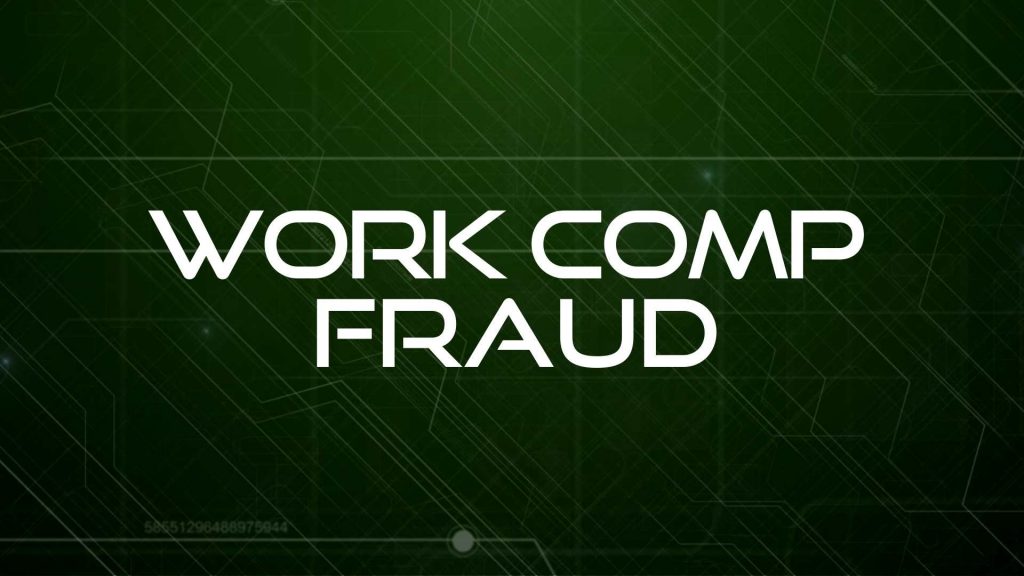As an insurance agent, you are the work comp expert. Your clients expect you to show them the signs for workers compensation fraud. If you help your client lay the groundwork for detecting work comp fraud, you can be the hero that they need!
In today’s post, we will walk through work comp fraud warning signs and how to move forward. To help you explain, the rest of this blog article is written as if it were directed to a business.
Why is Detecting Work Comp Fraud Important?
Workers’ comp insurance fraud costs $6-7 billion each year, according to estimates by the Coalition Against Insurance Fraud (CAIF) and the National Insurance Crime Bureau (NICB).
NICB rates workers’ compensation fraud as the second-most costly white-collar crime in America, behind tax evasion. It can happen in many forms; some examples are:
- Staging accidents
- Physicians who bill for not rendering treatment
- Injured workers who collect temporary total benefits for their job yet work another job
It’s important to understand that workers’ compensation insurance fraud is not a victimless crime and ultimately places increased financial burden on businesses. When false claims are made, they result in higher insurance premiums and thus increase the cost of doing business.
Prevent Work Comp Fraud – Warning Signs
To protect your business, it’s important for leaders in your company and you know the work comp fraud warning signs. Experience shows that when two or more key warning signs are present in a claim, there is a chance the claim may be fraudulent.
- Accident Day: The alleged injury occurs first thing on Monday morning, or the injury occurs late on Friday afternoon but is not reported until Monday.
- Hard-to-Reach Employee: Trouble contacting an employee on medical leave may be a sign the employee is working another job while collecting benefits.
- Employee Refuses Treatment
- Changes in Employment: Find out if the employee has a history of changing jobs, physicians, and addresses.
- History of Claims: Be aware if the employee has a history of filing claims that are suspicious.
- Late Reporting: The accident was not reported right away and there was no explanation for why it was reported late.
- No Witnesses
- Disgruntled Employee: An employee is likely to commit fraud after being denied a vacation request or being reprimanded.
- Suspicious Providers: An employee’s medical providers have a history of handling suspicious claims, or the same doctors and lawyers are used by groups of claimants.
- Conflicting Descriptions: The employee’s description of the accident conflicts with the medical history or first report of injury.
Remember, these are simply warning signs. Many perfectly legitimate claims are filed on Mondays and some accidents have no witnesses.
Prevent Work Comp Fraud – Reporting and Investigation
You should conduct a thorough incident investigation after every workplace accident—conduct a root cause investigation. This best practice helps uncover suspicious details around an incident. It also helps you prevent similar incidents from happening in the future by identifying the root cause and mitigating it.
If you notice details that don’t add up during your incident investigation, you should report it immediately. You should consult your legal counsel and insurance carrier or agent before taking any action against the employee. In general, terminating an employee before an investigation can expose you to more risk. It’s in your best interest to let fraud professionals do their jobs. You’ve done your part simply by reporting suspicious activity.
Reporting and the Investigation process is an entirely different blog post!
Recap
There is so much more that goes into the reporting process and the investigation. As insurance agents, you are the middleman between policyholders and carriers. Make sure your clients know the signs and clearly know how to report that to the carrier or to you.
At Mod Advisor, we are all about helping agents become work comp professionals. Our software has resources that can help explain work comp fraud, like a work comp fraud workbook, a workbook on the Injury Reporting Process, an employee incident/near miss report, an investigation checklist, and the list goes on.
If you want to see some of these resources or learn more about our mod analysis software, please schedule a demo with us.

